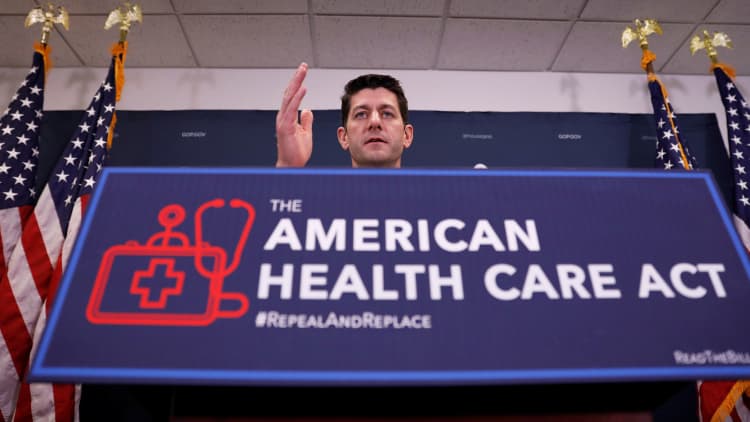
The odds of getting an Obamacare replacement bill passed by the House improved after the White House reportedly offered to tweak the plan by getting rid of the set of minimum benefits health insurers are now required to provide customers.
The House vote is crucial for the Trump agenda. President Donald Trump has said the repeal and replacement of Obamacare must happen before action can be taken on his other plans, including a tax reduction.
Early Thursday, Trump took to Twitter, urging supporters to call their representatives. Republicans need 215 votes for passage.
A source in the House's conservative Freedom Caucus, which has been seen as the biggest stumbling block for the bill, told CNBC that chances for passage of the plan during Thursday's scheduled vote increased with the offer.
That move, first reported by Politico, would undo another key part of the Affordable Care Act, one that has been blamed for driving up the cost of insurance.
The bone possibly being thrown to conservatives on the eve of the vote came in advance of an expected estimate of the replacement plan's effect on federal spending from the Congressional Budget Office.
But the revised CBO projection may not include estimates of how many people would become uninsured under the House bill, known as the American Health Care Act.
And it would only provide estimates based on a version of the bill amended in recent days, and would not reflect the effects of the latest changes being offered.
The Freedom Caucus earlier Wednesday had said more than 25 of its members opposed the bill, more than enough to kill it during a vote. The GOP can afford to lose no more than 22 of its caucus' votes.
But GOP leaders now are reportedly offering to change the bill so that it eliminates Obamacare's 10 essential health benefits. The benefits are the minimum level that insurers must offer in their health plan, including emergency services, preventative services, prescription drugs, lab services and hospitalization.
"If tonight's negotiations are fruitful, resistance to passage of the House Republican health care reform bill will crumble among holdout House Republicans and the bill will garner the necessary votes for passage. House Speaker Paul Ryan (R-WI) has not relented from his promise to call up the bill for passage tomorrow," Larry McDonald, managing director of ACG Analytics, wrote in a note to clients.
"So much is on the line. If this deal fails, the entire 2017 Washington policy timeline comes into question," he said.
"There's at least a 150 handles of legislative love priced into stocks at today's nosebleed levels. Traders are hoping this 'Hail Mary' lands on target," he added.
Trump and congressional Republican leaders have ramped up their efforts in recent days to persuade GOP lawmakers skeptical about the bill to back it so that it can be sent to the Senate.
The bill would undo and replace a number of major parts of the Affordable Care Act.
The CBO, in evaluating the original version of the bill, estimated last week that 14 million more people would be uninsured next year if the bill becomes law than would be the case if Obamacare remains in place.
By 2026, 24 million people would lose their insurance under the GOP bill than under Obamacare, the CBO said.
That would more than wipe out the gains in health coverage realized by 20 million Americans since the Affordable Care Act began taking effect in 2010.
The GOP bill also was projected to reduce federal spending by $337 billion by 2026, through a reduction in federal spending to subsidize purchases of individual insurance plans, as well as on Medicaid beneficiaries.
That reduction represents the difference between a $1.2 trillion decrease in direct spending and a reduction of $883 billion in revenues. The drop in revenue reflects a big tax break to wealthy people contained in the GOP bill, which would undo several levies on higher-income earners imposed by Obamacare.
—Written by CNBC's Dan Mangan, with reporting from CNBC's John Harwood and John Melloy.
Correction: This story was revised to correct that 215 votes are needed for passage since one Democratic congressman is not expected to be present.

